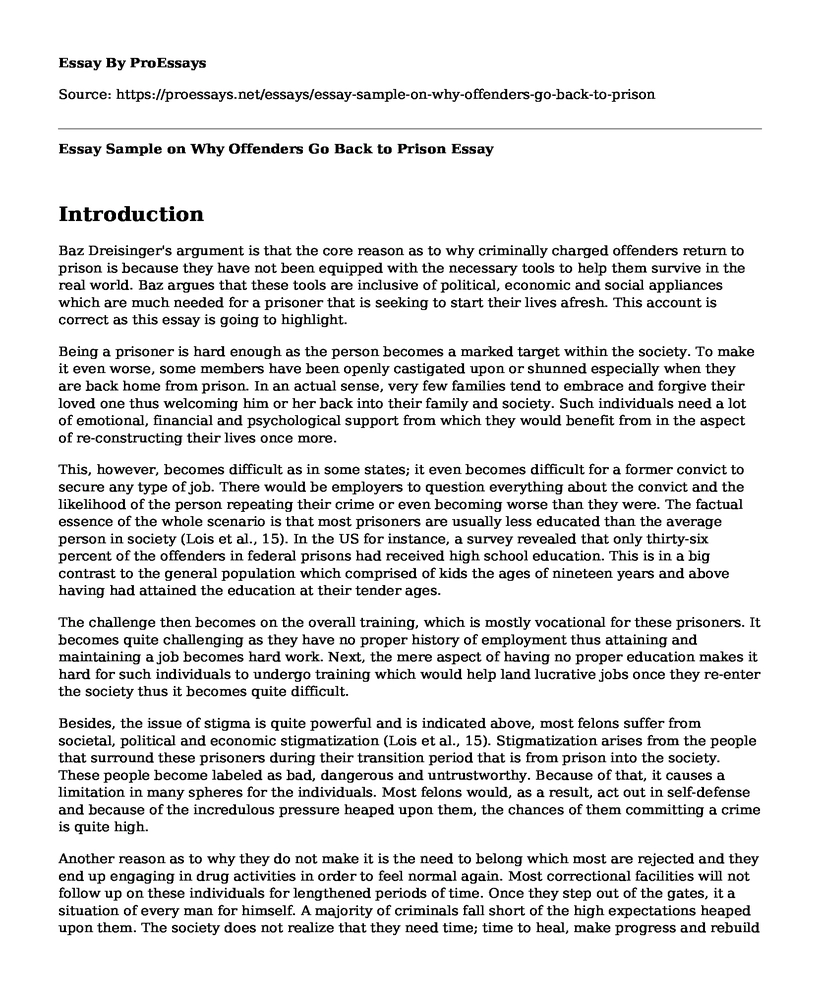Introduction
Baz Dreisinger's argument is that the core reason as to why criminally charged offenders return to prison is because they have not been equipped with the necessary tools to help them survive in the real world. Baz argues that these tools are inclusive of political, economic and social appliances which are much needed for a prisoner that is seeking to start their lives afresh. This account is correct as this essay is going to highlight.
Being a prisoner is hard enough as the person becomes a marked target within the society. To make it even worse, some members have been openly castigated upon or shunned especially when they are back home from prison. In an actual sense, very few families tend to embrace and forgive their loved one thus welcoming him or her back into their family and society. Such individuals need a lot of emotional, financial and psychological support from which they would benefit from in the aspect of re-constructing their lives once more.
This, however, becomes difficult as in some states; it even becomes difficult for a former convict to secure any type of job. There would be employers to question everything about the convict and the likelihood of the person repeating their crime or even becoming worse than they were. The factual essence of the whole scenario is that most prisoners are usually less educated than the average person in society (Lois et al., 15). In the US for instance, a survey revealed that only thirty-six percent of the offenders in federal prisons had received high school education. This is in a big contrast to the general population which comprised of kids the ages of nineteen years and above having had attained the education at their tender ages.
The challenge then becomes on the overall training, which is mostly vocational for these prisoners. It becomes quite challenging as they have no proper history of employment thus attaining and maintaining a job becomes hard work. Next, the mere aspect of having no proper education makes it hard for such individuals to undergo training which would help land lucrative jobs once they re-enter the society thus it becomes quite difficult.
Besides, the issue of stigma is quite powerful and is indicated above, most felons suffer from societal, political and economic stigmatization (Lois et al., 15). Stigmatization arises from the people that surround these prisoners during their transition period that is from prison into the society. These people become labeled as bad, dangerous and untrustworthy. Because of that, it causes a limitation in many spheres for the individuals. Most felons would, as a result, act out in self-defense and because of the incredulous pressure heaped upon them, the chances of them committing a crime is quite high.
Another reason as to why they do not make it is the need to belong which most are rejected and they end up engaging in drug activities in order to feel normal again. Most correctional facilities will not follow up on these individuals for lengthened periods of time. Once they step out of the gates, it a situation of every man for himself. A majority of criminals fall short of the high expectations heaped upon them. The society does not realize that they need time; time to heal, make progress and rebuild their self-confidence and esteem.
Conclusion
In conclusion, most prisoners need to be pillars of the society that would offer them support for them to make progressive steps which would help them be exemplary members of the society.
Work Cited
Davis, Lois M., et al. Evaluating the effectiveness of correctional education: A meta-analysis of programs that provide education to incarcerated adults. Rand Corporation, 2013.
Cite this page
Essay Sample on Why Offenders Go Back to Prison. (2022, Nov 05). Retrieved from https://proessays.net/essays/essay-sample-on-why-offenders-go-back-to-prison
If you are the original author of this essay and no longer wish to have it published on the ProEssays website, please click below to request its removal:
- Paper Example on Intellectual Property Standards
- Essay Sample on Four Theories of Criminality
- Personal Statement for Law School Admission
- Criminal Investigations: Understanding Crime Analysis in Law Enforcement - Research Paper
- Essay Example on DDoS Attack: Flooding Systems With Malicious Traffic
- Essay Sample on Juvenile Court System: Failing to Rehabilitate Youth & Provide 2nd Chance
- Legalizing Marijuana in All States - Essay Sample







